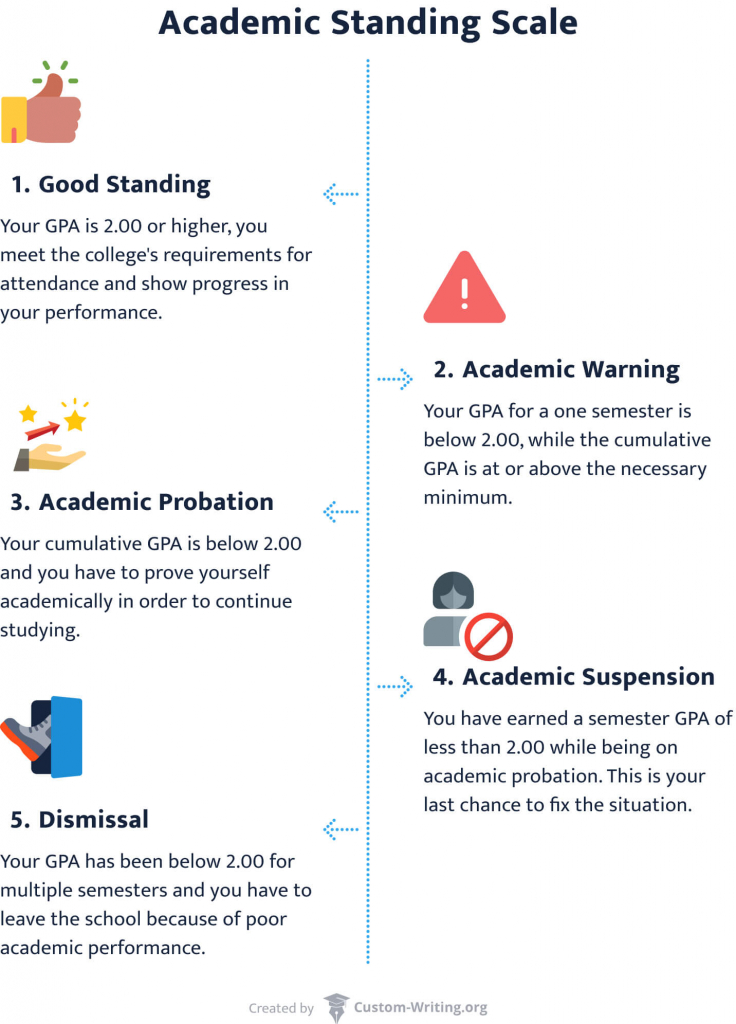Navigating the challenges of college life can be demanding, and sometimes students face academic difficulties that lead to consequences like probation. Understanding what academic probation entails, its potential risks, and how to avoid further academic penalties is crucial for any student striving for success in higher education. This article will delve into the intricacies of academic probation, providing you with a comprehensive guide to navigate this challenging situation.
We’ll explore the definition of academic probation, the specific requirements that trigger it, and the potential risks associated with this status. Furthermore, we’ll discuss strategies for avoiding suspension or dismissal, emphasizing the importance of improvement plans and academic advising in turning your academic performance around.
Academic Probation Definition
Academic probation is a formal warning issued by a college or university to students who are not meeting the minimum academic standards required for continued enrollment. Essentially, it signifies that your grades have fallen below a predetermined threshold, putting your academic standing at risk. Probationary status typically lasts for one semester or academic year, during which you must demonstrate significant improvement in your academic performance to avoid more severe consequences.
The specific GPA requirement for probation varies between institutions. Some colleges may have different probation levels based on the severity of your academic performance decline. For instance, a lower GPA might result in “conditional admission” while a significantly lower GPA could lead to full academic probation. It’s crucial to familiarize yourself with your college’s specific policies regarding academic probation to understand your situation accurately.
Requirements for Academic Probation
The primary requirement for being placed on academic probation is consistently achieving grades below the minimum GPA set by your institution. This often involves failing courses, earning a significant number of “D” or “F” grades, or having an overall GPA that falls short of the required standard. Colleges may also consider other factors, such as attendance records and participation in class, when determining probationary status.
In addition to academic performance, some colleges might have specific requirements for maintaining good standing. These could include adhering to conduct codes, fulfilling financial obligations, or participating in mandatory workshops or programs. Failure to meet these additional requirements can also contribute to being placed on academic probation. Always review your college’s handbook and policies to understand the complete set of expectations for maintaining good academic standing.
Risks of Academic Probation
Being placed on academic probation carries significant risks that can impact your future academic and professional goals. One of the most immediate consequences is a restricted course load, meaning you may be limited in the number of courses you can take each semester. This can delay your graduation timeline and potentially increase the overall cost of your education.
Furthermore, being on probation can negatively affect your academic record, making it more challenging to transfer to another institution or apply for graduate programs. Some employers also consider academic probation as a red flag during the hiring process, potentially limiting your job opportunities. It’s crucial to understand that academic probation is a serious matter with long-term implications, requiring immediate action and commitment to improvement.
Avoiding Suspension or Dismissal
The ultimate goal when facing academic probation is to avoid suspension or dismissal from college. This requires proactive effort, dedication to improving your academic performance, and consistent communication with your academic advisors. By taking the necessary steps to demonstrate progress and commitment to success, you can successfully navigate this challenging period and regain good standing.
One of the most effective strategies for avoiding further penalties is to develop a comprehensive improvement plan in collaboration with your advisor. This plan should outline specific goals, strategies, and resources to help you raise your GPA and improve your academic performance. Regularly meeting with your advisor to discuss your progress, address any challenges, and make adjustments to your plan is essential for staying on track.
Improvement Plans and Academic Advising
A well-structured improvement plan serves as a roadmap for academic success during probationary status. It typically includes specific goals, such as raising your GPA to a certain level within a defined timeframe, identifying areas where you need improvement, and outlining strategies to address those weaknesses. Your advisor can help you develop realistic goals based on your current academic standing and provide guidance on effective study habits, time management techniques, and available resources.
Academic advising plays a crucial role in supporting students on probation. Advisors offer personalized guidance, connect you with tutoring services or learning centers, and advocate for your needs within the college system. They can also help you navigate any administrative processes related to probation, ensuring you understand your rights and responsibilities.
Conclusion
Facing academic probation can be a daunting experience, but it’s not an insurmountable obstacle. By understanding the requirements, risks, and available resources, you can take proactive steps to improve your academic performance and avoid further penalties. Remember that seeking support from your advisors, utilizing available resources, and developing a comprehensive improvement plan are essential for turning your academic situation around and achieving success in college.



